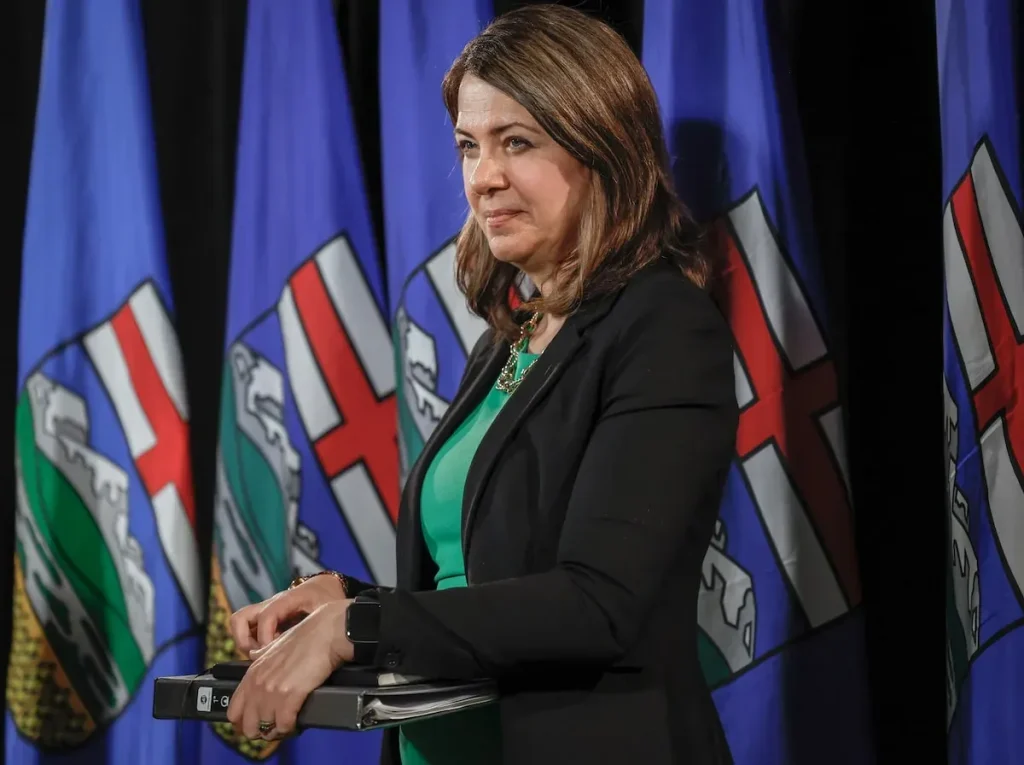Alberta Premier Smith’s popularity is surging, propelled by rising frustrations towards the federal government, particularly Ottawa. Recent Alberta poll results suggest that her approval rating among constituents has seen a notable increase, providing her with a competitive edge over rivals such as Naheed Nenshi. This shift in sentiment is especially pronounced among Albertans who, while identifying strongly as Canadians, feel their province has not been treated fairly by the federal government. Smith’s approach to Alberta-Ottawa relations resonates with this demographic, which does not necessarily advocate for separatism but seeks meaningful change. As tensions between Alberta and Ottawa heighten, the narrative surrounding Smith is evolving, showcasing her as a potential unifying figure amid calls for Alberta to assert itself more strongly on the national stage.
The trajectory of Premier Smith’s political popularity reflects an increasing alignment with the sentiments of many Albertans who express a blend of Canadian nationalism and provincial pride. This political climate finds its roots in ongoing debates surrounding Alberta separatism and discontent with federal governance. Smith’s rising support may stem from a perception that she is adept at navigating the complexities of Alberta’s relationship with Ottawa, particularly in the midst of heightened challenges. The dynamic between Premier Smith and her opponents, such as Nenshi, further emphasizes the shifting allegiances among voters as they weigh the prospects of provincial autonomy against national unity. As this rivalry intensifies, the upcoming polls could provide critical insights into how Albertans view their leadership in light of these pressing issues.
Alberta Premier Smith’s Rising Popularity Amidst Ottawa Tensions
Recent trends indicate that Alberta Premier Danielle Smith’s popularity is on the upswing, primarily due to increasing tensions between Alberta and Ottawa. According to a recent poll conducted by Alberta-based Janet Brown, Smith enjoys a significant lead over her political rival Naheed Nenshi, bolstered by her perceived ability to manage Alberta’s relationship with the federal government. This shift in public opinion is particularly notable among those Albertans who identify as Canadians but feel marginalized by Ottawa’s policies. They view Smith’s stance as a potential remedy for their grievances, which has solidified her support base across the province.
Smith’s appeal appears particularly strong among the middle third of Albertans who, despite their Canadian identity, are frustrated with how the province has been treated. This demographic does not necessarily favor separation, yet they express a desire for change in the provincial-federal dynamic. Smith has successfully tapped into their sentiment by articulating a vision for Alberta that emphasizes its rights and needs within the Canadian federation. As she continues to navigate this complex relationship with Ottawa, her ability to resonate with these voters will be pivotal in the upcoming elections.
Impact of Alberta Ottawa Relations on Smith’s Political Strategy
The relationship between Alberta and Ottawa has become a focal point for Premier Smith’s political strategy. The current political climate, marked by Alberta’s frustrations with federal policies, has given Smith a unique platform to position herself as a voice for Alberta’s interests. Her administration has been vocal about perceived injustices, which has garnered the attention and support of many Albertans who feel neglected by federal leadership. This strategy not only reinforces her popularity but also complicates the political landscape, forcing opponents like Nenshi to take firm stances that may alienate these crucial voters.
Moreover, the Alberta-Ottawa dynamics offer Smith the opportunity to rally support by presenting her as a defender of provincial autonomy. This narrative resonates particularly well among constituents who fear that their interests are secondary in the federal agenda. By emphasizing her commitment to negotiating better terms and advocating for Alberta’s needs, Smith seeks to consolidate her power, especially ahead of the next provincial election. The effectiveness of this approach will heavily rely on her ability to maintain public confidence leading up to her meetings with federal leaders.
Alberta Separatism: A Political Undertone in Smith’s Popularity
The rise of separatist sentiments among certain segments of Alberta’s population has given Danielle Smith an unforeseen advantage. While not all Albertans endorse the idea of separation, the discussion has sparked significant interest and engagement among voters who feel that their province deserves more autonomy. Polling data suggests that many Albertans are frustrated by the federal government’s indifference to their concerns, and Smith’s ability to navigate these waters is a key factor in her increasing popularity. By indirectly acknowledging separatist sentiments without fully endorsing them, she manages to align herself with the sentiments of key voter blocks.
This positioning complicates her political rivalry with Nenshi, who has characterized such sentiments as an extremist agenda. In contrast, Smith’s careful balancing act—vowing to advocate for Alberta’s interests while simultaneously denouncing extreme separatist views—appeals to a broader audience. Hence, her popularity is not merely a result of her hardline stances but rather a strategic maneuver that seeks to unify different factions within the province under her leadership.
Examining Alberta Poll Results: What They Mean for Smith
Recent Alberta poll results highlight significant trends in public sentiment regarding provincial leadership and priorities under Premier Danielle Smith. The data indicates that Smith has a notable double-digit advantage over her main rival, Naheed Nenshi, especially among voters who prioritize stronger provincial governance. These results emphasize Smith’s effectiveness in framing the narrative surrounding Alberta-Ottawa relations, which has become a decisive factor in her rising support. As many Albertans feel that Ottawa has historically undermined their interests, Smith’s emphasis on addressing these grievances resonates deeply with her constituents.
Furthermore, the polls reveal that Smith’s United Conservative Party commands broad support across various age demographics, showcasing her ability to connect with younger voters who may feel disenchanted with traditional federal politics. This is crucial as Alberta prepares for its next election, where projected support could translate into a significant majority. The success of her campaigning strategies and the effectiveness of appeals directly addressing Alberta’s concerns in relation to Ottawa will likely influence voter turnout and party loyalty.
The Smith-Nenshi Rivalry: A Study in Contrast
The political rivalry between Danielle Smith and Naheed Nenshi illustrates the broader ideological divides within Alberta. While Smith seeks to capitalize on rising discontent with Ottawa to strengthen her base, Nenshi has attempted to position himself as a steadfast defender of Canadian unity, challenging Smith’s approach as an embrace of extremist separatist tendencies. This contrast not only highlights their differing political philosophies but also provides voters with stark choices regarding their leadership preferences. As tensions rise, the rivalry is expected to intensify, with both leaders trying to articulate their respective visions for Alberta’s future.
The ongoing discourse surrounding their rivalry reflects deeper issues regarding identity and governance in Alberta. Many voters are watching how each leader navigates Alberta’s relationship with the federal government and how their policies address local grievances. Nenshi’s strategy to rally opposition against Smith’s perceived separatism might appeal to traditional federalist supporters, but it could alienate moderates who are simply seeking reforms in Ottawa’s approach to provincial matters. Smith’s rising popularity amidst this backdrop suggests a changing political landscape, where voters are eager for leaders who genuinely advocate for their rights and interests.
Future Prospects for Alberta’s Political Landscape Post-2025
Looking ahead, the political landscape in Alberta is susceptible to dramatic shifts influenced by both internal and external factors. Premier Danielle Smith’s current lead in polls suggests a stubborn persistence of Alberta’s distinct political identity, intertwined with rising discontent towards Ottawa. If Smith’s administration continues to successfully advocate for reforms and build trust among Albertans, her leadership could solidify a new political era characterized by greater provincial autonomy. However, her success largely hinges on navigating the possible repercussions of increasing separatist sentiments that her critics will likely spotlight.
Conversely, the possibility of a federal response to address Alberta’s grievances could also alter the political climate. If Prime Minister Mark Carney manages to cultivate a productive dialogue with Smith, it could potentially reshape Albertans’ perceptions, leading to decreased support for separatist voices. As Alberta prepares for crucial electoral contests, the outcomes will depend significantly on the effectiveness of both leaders in addressing the concerns and aspirations of Alberta’s diverse population while balancing the demands of broader Canadian unity.
Frequently Asked Questions
How is Alberta Premier Smith’s popularity affected by Alberta-Ottawa relations?
Alberta Premier Danielle Smith’s popularity has significantly risen due to growing tensions between Alberta and Ottawa. Many Albertans feel that their province is not treated fairly by the federal government, and Smith’s perceived ability to manage these relations has boosted her support among constituents.
What factors are contributing to the rise in Danielle Smith’s popularity in Alberta?
Danielle Smith’s popularity has increased largely due to her stance on Alberta’s grievances with Ottawa. A recent poll indicates that voters who identify as Canadians but feel mistreated by the federal government are gravitating towards Smith because she appears to address their concerns effectively.
What do recent Alberta poll results say about Danielle Smith’s standing against rivals?
Recent Alberta poll results show that Premier Danielle Smith holds a double-digit lead over her main rival, Naheed Nenshi. The poll suggests that her handling of Alberta-Ottawa relations correlates strongly with her growing popularity among Albertans.
How does Albertan identity influence support for Premier Smith?
Alberta’s political landscape is divided into three identity groups: those who feel most attached to Alberta, those who identify more with Canada, and those who are balanced between both. Danielle Smith has effectively appealed to the middle group, who value their Canadian identity but are frustrated with federal treatment, thus increasing her popularity.
What role does the Smith-Nenshi rivalry play in public perception?
The rivalry between Danielle Smith and Naheed Nenshi is pivotal in shaping public perception. Nenshi’s strong federalist stance has positioned him in opposition to Smith, who resonates more with Albertans dissatisfied with federal relations, further elevating Smith’s popularity among voters seeking change.
What implications do Alberta separatism views have on Smith’s support?
While not all Albertans support separatism, the sentiments around Alberta separatism have inadvertently benefited Danielle Smith’s popularity. Many Albertans feel frustration over their treatment from Ottawa and gravitate towards Smith, who addresses those feelings without fully endorsing separation.
What is the future outlook for Alberta Premier Smith based on current popularity trends?
Based on current trends and widespread support across various demographics, Premier Danielle Smith’s United Conservative Party appears poised to secure a strong majority in the upcoming provincial election, thanks to rising popularity linked to Alberta-Ottawa tensions.
How do the sentiments towards the federal government affect Danielle Smith’s political strategy?
Danielle Smith’s political strategy is heavily influenced by the prevailing sentiments towards Ottawa. Her focus on advocating for Alberta’s interests and addressing dissatisfaction with federal relations has been a cornerstone of her appeal, enhancing her popularity among Alberta voters.
| Key Points |
|---|
| A recent Alberta poll indicates rising popularity for Premier Danielle Smith amid tensions with Ottawa. |
| Smith’s approval is growing among Albertans who see Ottawa’s treatment of the province as unfair. |
| The poll shows Smith with a double-digit advantage over rival Naheed Nenshi. |
| Smith appeals to a segment of Albertans who identify as Canadians but desire a change in their relationship with Ottawa. |
| Nenshi has a hardline federalist stance, contrasting with Smith’s approach. |
| Smith’s United Conservative Party is projected to win a significant majority in upcoming elections. |
Summary
Alberta Premier Smith’s popularity is currently on the rise, fueled by growing tensions between Alberta and Ottawa. This sentiment is particularly strong among Albertans who still hold a Canadian identity but feel that their province is unjustly treated by the federal government. As she prepares for discussions over national unity with Prime Minister Mark Carney, the upcoming first ministers’ meeting could further shape her standing. If she can navigate these relations successfully, Smith’s approval ratings may continue to soar, further solidifying her position ahead of the next provincial election.



